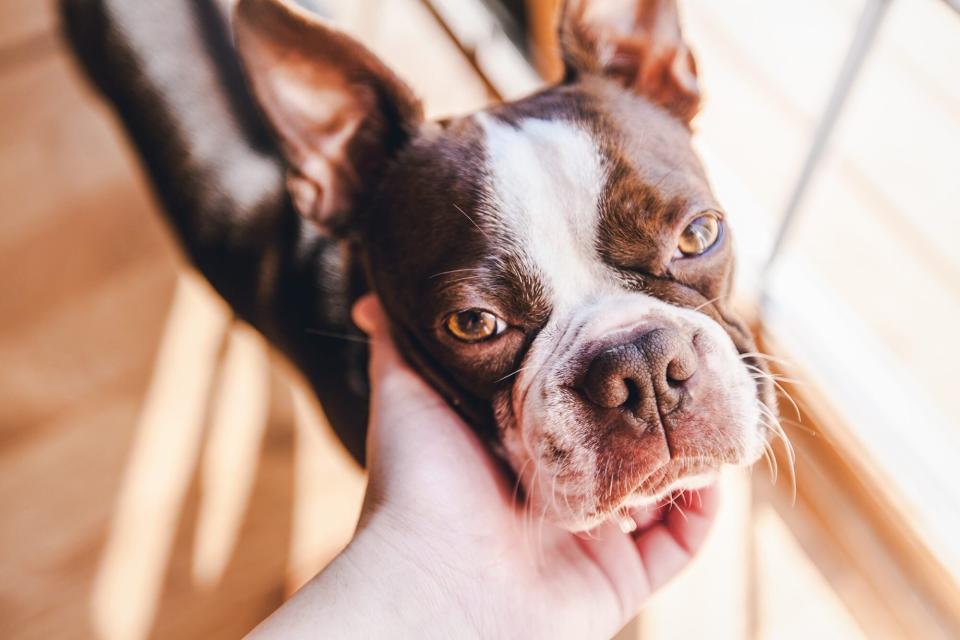Pneumonia in Dogs Is a Serious, But Treatable Condition
Feeling troubled by your dog's coughing? Trust your gut. Persistent coughing is a sign that something's wrong with your pup's respiratory system and it could be pneumonia. Like in people, pneumonia in dogs is a serious but treatable condition especially if it's caught at an early stage. Read on to learn more about pneumonia in dogs and how you can help your pooch bounce back.
Causes of Pneumonia in Dogs
Pneumonia occurs when your dog's lungs become inflamed and make breathing difficult, explains Jamie Whittenberg, DVM, owner of Kingsgate Animal Hospital in Lubbock, Texas, and Senior Tailwaggers contributor. "When affected by pneumonia, the small air sacs in the lungs become filled with fluid and can't oxygenate the blood properly."
While pneumonia in cats is rare, it's one of the most common diagnoses in dogs who are experiencing breathing problems, Whittenberg reports. Wondering how dogs get pneumonia? It develops in multiple ways.

Rebecca Nelson / Getty
Bacterial Pneumonia
The most common way dogs get pneumonia is through a bacterial infection of the lungs. One of the top culprits is bordetella bacteria (kennel cough), which is why the bordetella vaccine is so important.
Viral Pneumonia
This type of pneumonia is caused by viral lung infections. Canine distemper and canine influenza—two viruses your pooch can get vaccinated for—frequently cause viral pneumonia.
Fungal Pneumonia
More rarely, pneumonia is caused by a fungal infection of the lungs. This typically happens when a dog inhales fungal spores found in things like soil or fallen leaves. Most healthy dogs can successfully fight off fungal spores. But dogs with weakened immune systems are more likely to develop fungal infections.
Aspiration Pneumonia
Aspiration pneumonia is caused by inhaling a foreign substance like liquid medicine, vomit, food, or water. According to the Merck Veterinary Manual, the type of inhaled material and how far it is spread through the lungs will dictate the severity of illness.
Signs and Symptoms of Pneumonia in Dogs
No matter how your dog gets pneumonia, the resulting irritation and inflammation of the lungs generally cause the same symptoms. Coughing is a hallmark sign but it can also indicate other conditions such as collapsed trachea, kennel cough, and even heart disease. In addition to coughing, pneumonia may cause some of the following symptoms in your dog:
"Blowing" of the lips
Difficulty breathing
Lack of energy
Nasal discharge
Exercise intolerance
Is Canine Pneumonia Contagious?
"Bacteria and viruses that cause pneumonia can pass from dog-to-dog and dog-to-cat," Whittenberg says. "It's possible, but extremely rare, for dogs to pass respiratory infections to people." If you have multiple pets in your home, it's best to keep your sick pup isolated from the rest of the gang while he recovers.
How to Treat Pneumonia in Dogs
Pneumonia in dogs can be fatal if left untreated. So it's important to seek veterinary care if you notice any signs of pneumonia in your pooch. What treatment your dog receives depends on the type of pneumonia your dog has and may include:
Antibiotics, which kill bacteria
Antiviral medications, which fight off viruses
Cough medicine, which reduce the urge to cough
Bronchodilators, which open up airways
Anti-inflammatory medications, which decrease swelling and irritation
RELATED: Can You Give Dogs Ibuprofen?
How to Help a Dog With Pneumonia at Home
"Until your dog can be seen by a vet, keep your pet calm and in a warm and comfortable environment," Whittenberg recommends. "You can offer food and water, but don't give your dog any over-the-counter medicine because it could interfere with medications your vet prescribes."
The good news about pneumonia in dogs is that it can often be avoided, says Whittenberg. Focus on keeping your pup in good health and don't let your pooch be around dogs that aren't feeling well. Most importantly, keep your furry pal current on vaccines, especially Bordetella and DHPP (distemper, hepatitis, parvovirus, and parainfluenza). They prevent bacterial and viral infections that can lead to pneumonia. And if your furry pal has any concerning symptoms, don't hesitate to see your veterinarian—timely treatment often stops respiratory illnesses from progressing to pneumonia.

